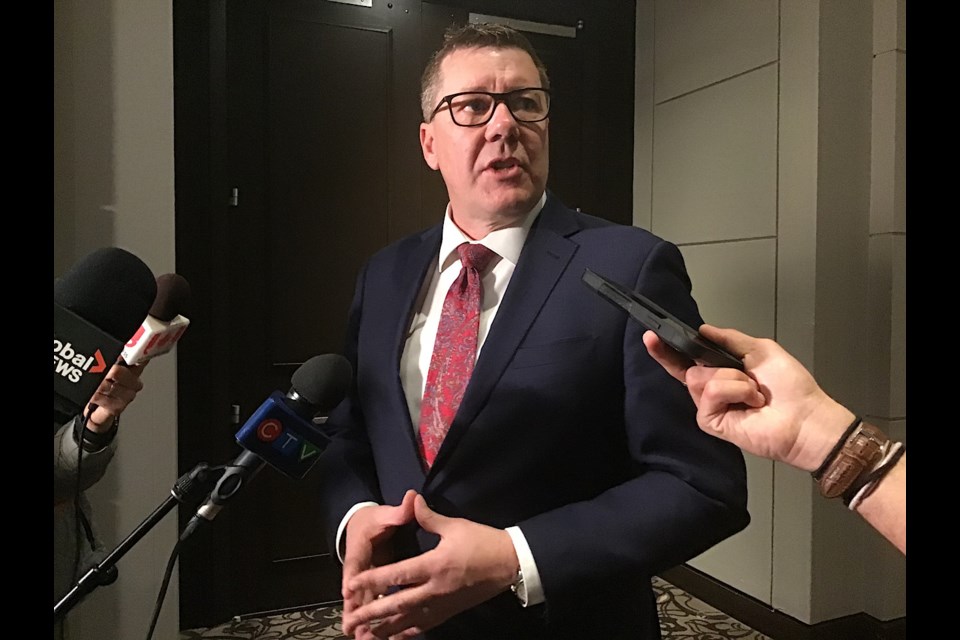REGINA - It may have been the Williston Basin Petroleum Conference, but it seemed electricity and power were what was top of mind for Premier Scott Moe at the event.
In fact, the transition to clean energy and looming net zero targets were very much on the mind of delegates at the 30th annual conference, with both the energy transition as well as CCUS — carbon capture utilization and storage — as major topics over two days of this year’s event on May 2-3.
Moe made the point during his address that energy security was vitally important — comparing it to the importance of food security.
“Energy in all of its forms — it is the very bedrock of our society,” Moe said. “Without that access to secure, affordable supplies of energy, we are in big trouble.”
During his morning remarks, Moe spoke of “protecting that environment of opportunity that we have in Saskatchewan” from “unrealistic policies, ideological policies versus policies that are much more based in reality. Policies that are quite frankly at times are threatening the energy security, the continental energy security that you are part of building.”
Moe took aim at the cap on emissions policy from the federal government, saying it was “a policy that is driven much more by ideology than what is I like to call common sense. It’s unrealistic, it’s impossible.”
He said the same could be said of the federal government’s clean electricity regulations currently under development. Moe said it “indirectly impacts everyone in this room.”
Moe pointed to provincial initiatives to lower emissions such as the carbon capture facility built at Boundary Dam 3, as well as SaskPower building natural gas plants to increase the stability of the grid and also reduce their emissions profile. He also pointed to power stations coming into service that use natural gas and emit half the CO2 of coal powered plants.
“But that is not good enough for the clean emission standards,” said Moe. He said under the new regulations SaskPower wouldn’t be able to operate any coal fired plants and might have to shut down their natural gas power plants.
He said it begged the question “where would we get our baseload electricity from?”
He spoke about the net zero 2035 target and voiced concern that it doesn’t contemplate the eventuality of not having baseload power, or the “extraordinary costs” associated with meeting the targets.
“We will not attempt the impossible when it comes to power production,” Moe told the audience at the Delta Regina.
“We are not going to risk plunging our homes, our schools, our hospitals, our businesses that are operating creating wealth in our communities because of the ideological whims of another level of government. We are not going to put the security of the energy system we have here in jeopardy, and we will not increase power costs unnecessarily for our industries our businesses and our families in this province to the point where they are completely unaffordable.”
He said Saskatchewan requires reliable, affordable electricity, and said that “most certainly will be the case years into the future.” Moe said to “stay tuned” for more details to come on their response to the federal government’s clean electricity regulations.
In speaking to reporters, Premier Moe noted again that the federal regulations coming in mandates no coal fired plants by 2030 and “quite likely” no natural gas by 2035.
“We have a natural gas plant that isn’t even completed construction yet. We have no intention to turn it off by 2035. I’m not sure we’re going to be able to turn our coal off by 2030… this isn’t about SaskPower and the province not continuing their march towards greening our power grid. It’s about what’s affordable and about what’s possible versus some ideological policy that may come from another level of government.”
He pledged to continue to more towards a 2050 target that the province had originally set out.
“We are going to continue to chart Saskatchewan’s path. It may not necessarily be Canada’s path and we’ll have more details on that in the coming weeks.”
He also raised the spectre of what might happen in the province when the 2035 deadline hits.
“If you think about where Saskatoon, the city of Saskatoon receives their power, Jan. 1, 2035 is a very cold morning in Saskatoon because the lights won’t come on and the furnace fans won’t work,” said Moe.
“The unrealistic policy here is coming from the federal government. The realistic policy is being put forward by SaskPower and the province of Saskatchewan, and you’re seeing other provinces come to the same conclusions.”
Opposition critic Aleana Young was at the conference and didn’t think Moe’s comments were that helpful.
“Quite frankly, just continues a lot of unproductive rhetoric when people need action to keep power affordable and reliable and sustainable.”
As for her own party’s position Young said they had been “clear and on message — the Feds are going too far too fast and 2035 isn’t realistic for a jurisdiction like Saskatchewan. However, what’s lacking behind the Premier’s promise is any real action.”
She accused the government of being “dinosaurs” on renewables, and said with this government “we see an ongoing commitment to make investments that are not in Saskatchewan, investing south of the border, spending over a million dollars of taxpayer money to spend on infrastructure in the United States, or spending $5 million next door in Manitoba. I fail to see how that is creating energy security in Saskatchewan or good paying jobs for Saskatchewan people...They’ve been behind the ball on this for 15 years.”




